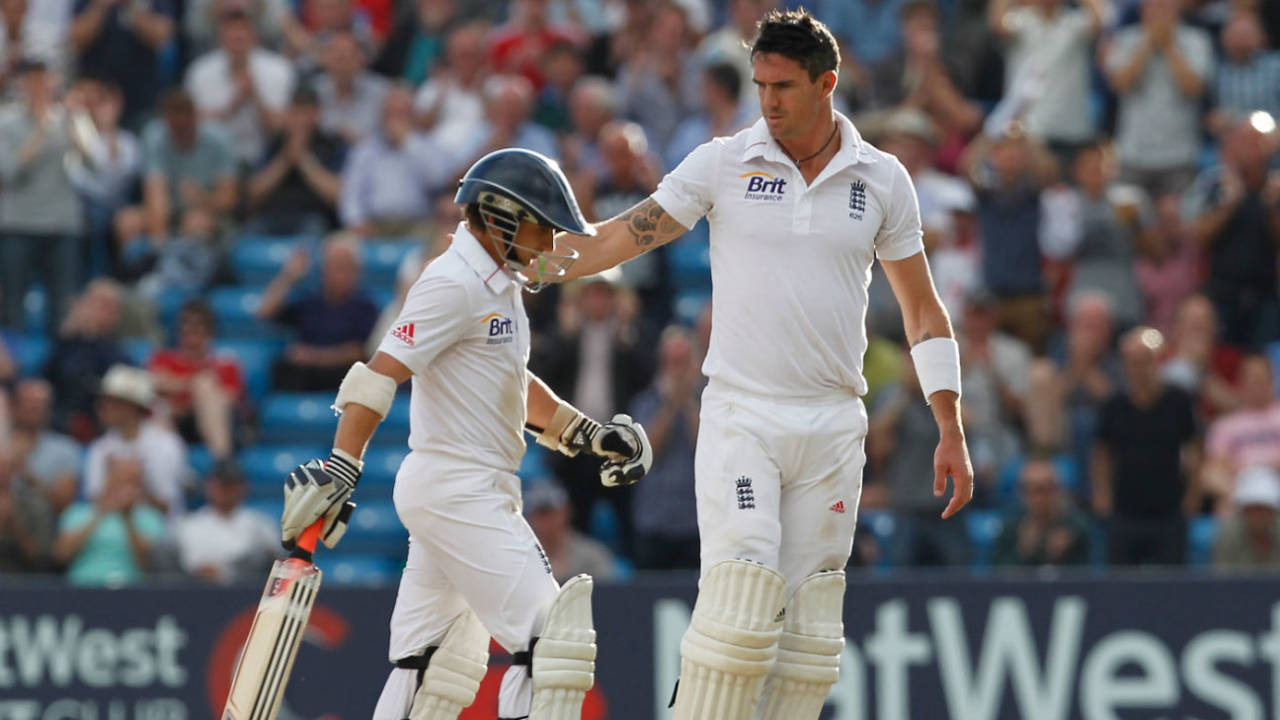James Taylor, from the heart
The former England batsman's autobiography is a tale of survival in more ways than one
Alan Gardner
Oct 6, 2018, 7:00 AM
Taylor has been on the receiving end of heightist criticism from Kevin Pietersen • AFP
Even as England completed their Test summer with a 4-1 victory over India, amid tributes and tears at The Oval for the departing Alastair Cook, worries about their top-order batting nagged away. Recent years have featured more walk-on parts than the average Marvel movie, players moving up and down the order in the manner of sailors climbing the rigging, and a solid line-up an increasingly distant memory.
One of the men who briefly occupied a berth in England's evanescent middle order - and hinted at long-term stability, too - is now among the sages who selected the Test squad for Sri Lanka, the first without Cook in more than a decade. It was in the strength-sapping heat of Colombo on England's tour four years ago that James Taylor finally came of age as an international cricketer, and by the following winter he was back in the Test side too. Then came the bewildering sadness of his retirement at age 26, following the discovery of a heart condition that nearly killed him.
It is little more than two years since Taylor's first brush with arrhythmogenic right ventricular cardiomyopathy (ARVC), though such is sport's relentless forward focus that it takes some effort to cast back to his last England appearances, on the 2015-16 tour of South Africa. Taylor scored 70 and 42 in the victory in Durban, before holding a couple of show-stopping catches at short leg in Johannesburg, as England won the Test series - their most recent success overseas. His penultimate innings as a professional cricketer was a century in a one-day warm-up match in Kimberley.
But his career came crashing to a halt in April 2016, during a routine county pre-season trip to Cambridge. The opening sentences of his autobiography, Cut Short, set the tone with brutal candour:
"By rights, I shouldn't be writing this book. I should have been found dead at the bottom of a flight of stairs. Or in the passenger seat of a car. Or on a cold wooden bench in a distant dressing room far from friends and family."
The details of Taylor's close encounter with mortality are well known. His recovery from the attack, described by doctors as "the equivalent of running six marathons", has provided inspiration beyond the small world of sport - a batsman for whom "survival" is more than just a figurative description - but the life-long implications of ARVC mean a shadow is constantly near.
For six weeks after having a defibrillator fitted, Taylor could not lift his arm above shoulder height in case it pulled the wires out of his heart; he was then "blown back several paces" across a room due to the implant going off during a speaking engagement. It must be quite an adjustment to have to make, from thriving on the atmosphere of playing in front of thousands at Lord's or the MCG, to being wary of loud noises coming from the television. Exercise is off limits, standing up too quickly can cause dizziness - because of the beta blockers he takes - and even lying on his wrong side in bed can cause discomfort.
More disturbing for those concerned with how the game looks after former players was the fight Taylor faced to be compensated for the abrupt loss of his livelihood. Missed opportunities to diagnose his condition earlier meant he was only offered an insurance payout that "added up to little or no more than my previous year's earnings", and the stress of the situation contributed to the defibrillator incident on stage at Grace Road, where he was taking part in a Q&A to earn extra cash. The unhappy prospect of suing the ECB was discussed.

White Owl
Eventually, the board's chief executive, Tom Harrison, admitted the system had let Taylor down. That Taylor is now an employee of the governing body, having been appointed as an England selector this summer, suggests trust has been successfully rebuilt.
While Cut Short inevitably revolves around the circumstances of his cruelly attenuated career, Taylor's time in cricket already had the potential for an interesting tale. Memorably dismissed by Kevin Pietersen as too short to play for England - "What a twat" is Taylor's pithy riposte - he seemingly had to fight more than most for his chances. Proving wrong the people who doubted his ability became a prime motivator, though that in itself brought extra pressure. "My entire cricket career was based on a fear of failure," he writes.
Recognition eventually came, though he had barely become used to a regular playing role before ARVC finally presented an obstacle he could not overcome. What he could have offered England is now a matter for rainy-day discussions, just another closed chapter, as the relentlessly forward-looking Taylor would put it. As he has subsequently shown, moving into commentary, working as an ambassador with the British Heart Foundation and Chance to Shine, and now becoming a selector, life is what you make of it. And his story is still being written:
"I don't want to live as a grey silhouette of my former self. I want to shine brightly, for myself and all around me. Why be a closed book when you can throw open your pages to everyone? Why see ARVC as a full stop when it's the next chapter of the story? Why add yourself to the shelf marked 'History' when there's a whole new exciting future ahead?"
Cut Short
By James Taylor
White Owl, 2018
£20, 185 pages
By James Taylor
White Owl, 2018
£20, 185 pages
Alan Gardner is an associate editor at ESPNcricinfo. @alanroderick
